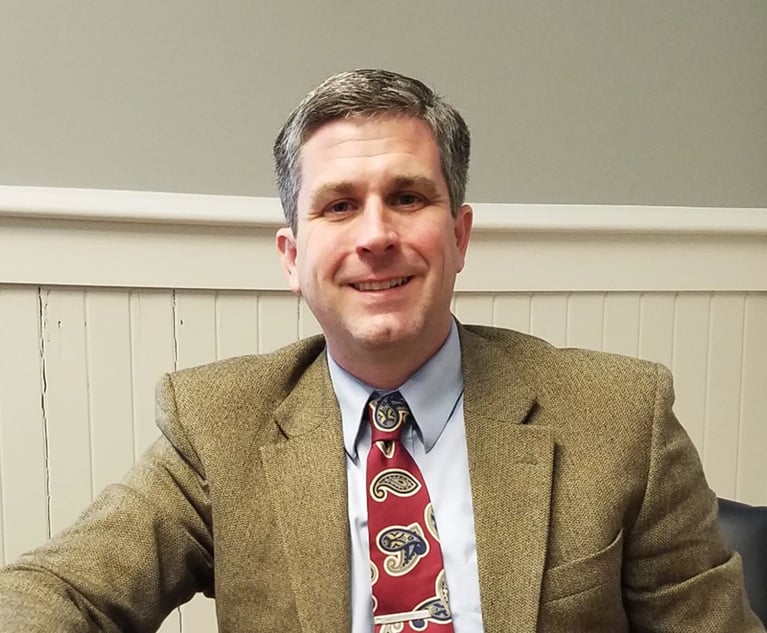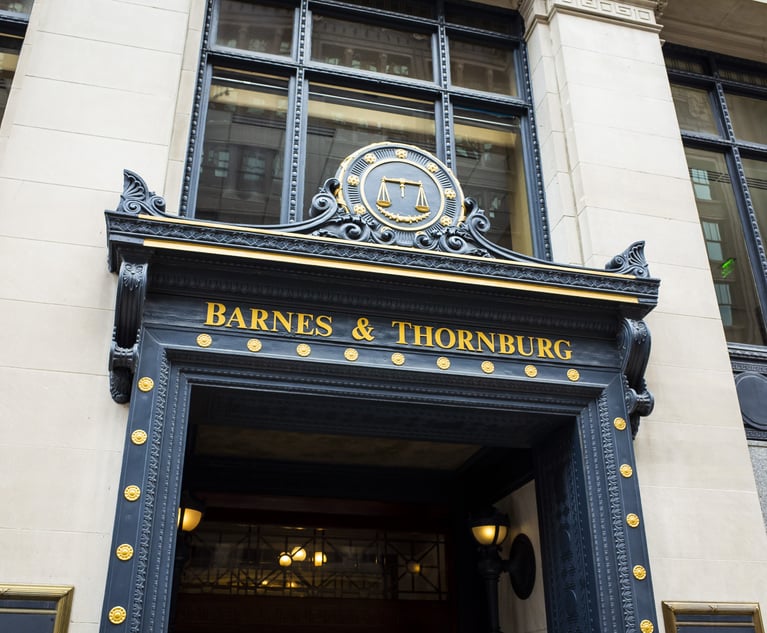Ford Wants Judge to Recuse From Contentious Roof Crush Case
Ford's lawyers have filed a motion to recuse Gwinnett County State Court Judge Shawn Bratton, accusing him of “one-sided rulings,” “abdicating judicial responsibility” and “refusal to at least admonish” opposing counsel.
April 17, 2018 at 10:58 AM
6 minute read

The fighting between lawyers in a Ford Motor Co. roof crush case has now turned against the judge.
Ford's lawyers have filed a motion to recuse Gwinnett County State Court Judge Shawn Bratton, accusing him of “one-sided rulings,” “abdicating judicial responsibility” and “refusal to at least admonish” opposing counsel.
“I'm without comment,” the judge said Monday by email.
Bratton declared a mistrial April 6 after both sides requested it. Less than a week later, on April 12, Ford asked for a new judge in the next round.
“Deep into a trial involving automotive products-liability claims stemming from the tragic deaths of Melvin Hill and Voncile Hill in a rollover accident, the Honorable Shawn F. Bratton crossed a line,” Ford's motion to recuse said in the opening line. Ford alleged that Bratton “openly assumed the role” of adviser and ally to the other side.
Ford's lead counsel is D. Alan Thomas of Huie Fernambucq & Stewart in Birmingham, working with Paul Malek of his firm. Their team includes Michael Eady of Thompson Coe Cousins & Irons of Austin, Texas. Their Atlanta lawyers are Michael Boorman and Philip Henderson of Huff, Powell & Bailey and J. Randolph Evans of Dentons.
All those names appear on the motion to recuse Bratton. Along with it, Boorman filed a supporting affidavit.
Boorman's affidavit provided a succinct summary of the case. “While Ford did not dispute that it could have made a stronger roof, it did dispute that the F-250 Super Duty roof was weak,” Boorman said. “Further, field data and testing has proven that making a strong roof stronger will not make a vehicle 'injury proof' in severe rollover crashes.”
But in the highly contentious three-week trial, the Hills' surviving sons, Kim and Adam, alleged that the roof killed their parents because it was weak and could have been improved for a cost of $100 per truck.
The Hills' lead counsel is Jim Butler of Butler Wooten & Peak, who has won verdicts in excess of $100 million in product liability cases against General Motors and Chrysler. His legal team includes Gerald Davidson Jr. of Mahaffey Pickens Tucker in Lawrenceville, who worked with Butler in a 1993 trial against GM when a jury awarded $105 million to the parents of Shannon Moseley. That verdict—which included $101 million in punitive damages—was later overturned, and the case settled before it was tried again.
The Butler team also includes David Rohwedder of the Butler Wooten firm, based in Columbus and Atlanta. Rohwedder was on Butler's trial team for the parents of 4-year-old Remi Walden against Fiat Chrysler. They won a $150 million verdict, which the judge reduced to a $40 million award. The Georgia Supreme Court upheld the Walden judgment just before the Hill trial started. Brandon Peak, Christopher McDaniel and Ramsey Prather of Butler Wooten are also on the team, as is Michael Gray of Walker, Hulbert, Gray & Moore in Perry.
“I have scanned this latest from Ford and its lawyers and will only state preliminarily that Ford and its lawyers must truly be deranged, perhaps by the mauling they suffered during trial,” Butler said by email Thursday evening after the motion to recuse was filed. “I have never seen anything remotely like this incessant misrepresenting of the record and mindless but hideous false accusations—against everybody—the plaintiffs, plaintiffs' counsel, plaintiffs' witnesses, and now the court.”
Butler's opponents' account of the trial in the motion to recuse the judge was that “Ford had begun to build momentum in its defense.” Butler, Ford alleged, was “therefore focused on ending the trial without permitting a jury verdict.”
Ford accused the judge of giving Butler “unsolicited legal advice” by discussing the procedure for declaring a mistrial. Ford also took issue with Bratton's decision to exclude the testimony of a key defense witness for discussing matters outside what the judge had ruled he was qualified to discuss—cause of death.
These and other events, Ford alleged, brought the judge's impartiality into question. The complaints went all the way back to comments made by Butler on the first day of voir dire that his opponents said were improper and should have drawn admonishment from the judge.
Ford accused Butler of racism because he asked a prospective juror if she was of Indian descent, as was Ford's corporate representative at the trial. Butler never finished his question, but in the argument that followed he noted no opposition when a juror had been asked about being from England.
Ford accused Butler of being sexist because of his answer when the judge asked if a prospective juror, who was also a student and an Atlanta Hawks cheerleader, should be allowed to return to school.
“I've got two young lawyers out here that would be very sorely disappointed if she's not on this jury for two weeks,” Butler replied, according to the transcript quoted in the motion.
Ford counsel objected, saying—according to the motion—“I just wanted to note on the record my objection at the end of the colloquy about whether or not it's preferential for two young male associates to have the benefit of an attractive female.”
Ford accused Butler of discrimination against people with disabilities because he argued against seating a juror who was blind. He said his case was document intensive, and having to wait for a blind juror to use special equipment to follow it would slow down the trial.
Finally, Ford accused Butler of “unchecked discriminatory behavior” during the trial for asking to exclude an African-American witness. In that matter, Butler was actually accusing Ford of trying to force him to stand up in front of the jury and say the witness was not qualified to testify in order to create a false impression of racism.
Butler said the allegations of racism, sexism and discrimination against people with disabilities were insincere attempts to gain advantage.
“Being accused of those things by Ford and its lawyers is like being called ugly by a frog,” Butler said. “They turned the trial into a circus and now they're into a cesspool. They are totally desperate because they have no defense.”
The case is Hill v. Ford, No. 16 C 04179-2.
This content has been archived. It is available through our partners, LexisNexis® and Bloomberg Law.
To view this content, please continue to their sites.
Not a Lexis Subscriber?
Subscribe Now
Not a Bloomberg Law Subscriber?
Subscribe Now
NOT FOR REPRINT
© 2025 ALM Global, LLC, All Rights Reserved. Request academic re-use from www.copyright.com. All other uses, submit a request to [email protected]. For more information visit Asset & Logo Licensing.
You Might Like
View All

Justice 'Weaponization Working Group' Will Examine Officials Who Investigated Trump, US AG Bondi Says


Georgia Justices Urged to Revive Malpractice Suit Against Retired Barnes & Thornburg Atty
4 minute readTrending Stories
Who Got The Work
J. Brugh Lower of Gibbons has entered an appearance for industrial equipment supplier Devco Corporation in a pending trademark infringement lawsuit. The suit, accusing the defendant of selling knock-off Graco products, was filed Dec. 18 in New Jersey District Court by Rivkin Radler on behalf of Graco Inc. and Graco Minnesota. The case, assigned to U.S. District Judge Zahid N. Quraishi, is 3:24-cv-11294, Graco Inc. et al v. Devco Corporation.
Who Got The Work
Rebecca Maller-Stein and Kent A. Yalowitz of Arnold & Porter Kaye Scholer have entered their appearances for Hanaco Venture Capital and its executives, Lior Prosor and David Frankel, in a pending securities lawsuit. The action, filed on Dec. 24 in New York Southern District Court by Zell, Aron & Co. on behalf of Goldeneye Advisors, accuses the defendants of negligently and fraudulently managing the plaintiff's $1 million investment. The case, assigned to U.S. District Judge Vernon S. Broderick, is 1:24-cv-09918, Goldeneye Advisors, LLC v. Hanaco Venture Capital, Ltd. et al.
Who Got The Work
Attorneys from A&O Shearman has stepped in as defense counsel for Toronto-Dominion Bank and other defendants in a pending securities class action. The suit, filed Dec. 11 in New York Southern District Court by Bleichmar Fonti & Auld, accuses the defendants of concealing the bank's 'pervasive' deficiencies in regards to its compliance with the Bank Secrecy Act and the quality of its anti-money laundering controls. The case, assigned to U.S. District Judge Arun Subramanian, is 1:24-cv-09445, Gonzalez v. The Toronto-Dominion Bank et al.
Who Got The Work
Crown Castle International, a Pennsylvania company providing shared communications infrastructure, has turned to Luke D. Wolf of Gordon Rees Scully Mansukhani to fend off a pending breach-of-contract lawsuit. The court action, filed Nov. 25 in Michigan Eastern District Court by Hooper Hathaway PC on behalf of The Town Residences LLC, accuses Crown Castle of failing to transfer approximately $30,000 in utility payments from T-Mobile in breach of a roof-top lease and assignment agreement. The case, assigned to U.S. District Judge Susan K. Declercq, is 2:24-cv-13131, The Town Residences LLC v. T-Mobile US, Inc. et al.
Who Got The Work
Wilfred P. Coronato and Daniel M. Schwartz of McCarter & English have stepped in as defense counsel to Electrolux Home Products Inc. in a pending product liability lawsuit. The court action, filed Nov. 26 in New York Eastern District Court by Poulos Lopiccolo PC and Nagel Rice LLP on behalf of David Stern, alleges that the defendant's refrigerators’ drawers and shelving repeatedly break and fall apart within months after purchase. The case, assigned to U.S. District Judge Joan M. Azrack, is 2:24-cv-08204, Stern v. Electrolux Home Products, Inc.
Featured Firms
Law Offices of Gary Martin Hays & Associates, P.C.
(470) 294-1674
Law Offices of Mark E. Salomone
(857) 444-6468
Smith & Hassler
(713) 739-1250






